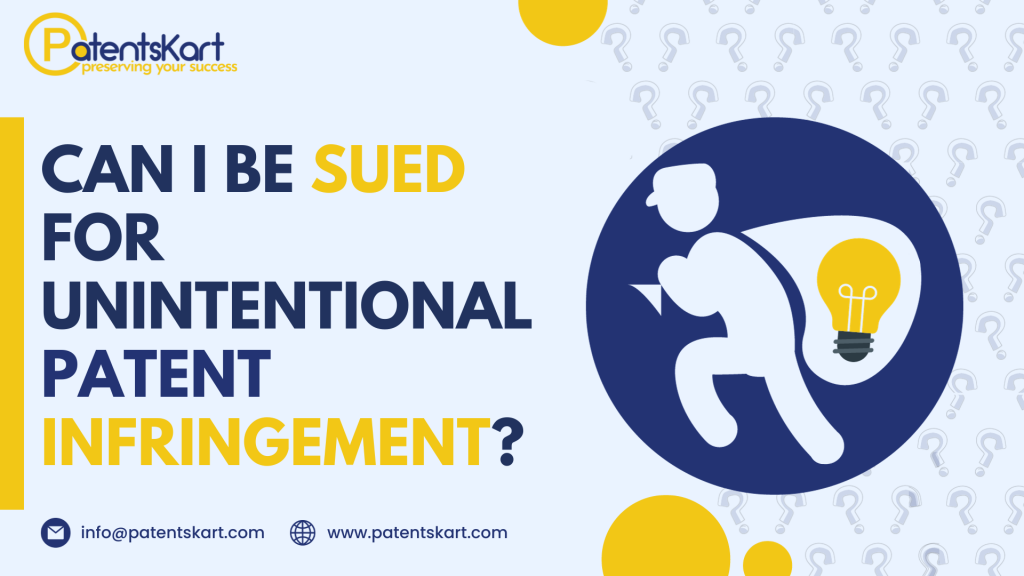You’ve worked hard to bring your innovative ideas to life, securing patents to protect your intellectual property. But what happens if you unknowingly infringe on someone else’s patent? Can you be sued for unintentional patent infringement? In this blog, we’ll explore the implications of unintentional patent infringement, the consequences it can bring, and how to avoid finding yourself in such a situation.
Understanding Patent Infringement
Before delving into unintentional patent infringement, it’s crucial to comprehend what patent infringement is. Patent infringement occurs when a party, without authorization, makes, uses, sells, or imports a patented invention. This violation of the patent holder’s exclusive rights can lead to legal consequences.
Types of Patent Infringement
Patent infringement can take various forms:
- Literal Infringement: This happens when someone creates or uses a product that directly replicates each element of the patented invention.
- Doctrine of Equivalents: Even if a product doesn’t exactly replicate a patented invention, it can still infringe if it performs substantially the same function in a substantially similar way.
- Contributory Infringement: When one knowingly provides a component or material that aids others in infringing a patent, they can be held liable.
- Induced Infringement: If someone knowingly encourages or aids others in infringing a patent, they can be sued for induced infringement.
Consequences of Patent Infringement
Unintentional patent infringement can lead to serious consequences, both financially and legally:
- Financial Penalties: If found liable for patent infringement, you may be required to pay damages to the patent holder. These damages can be substantial, including the actual damages suffered by the patent holder and any profits you may have made from the infringement.
- Injunctions: Courts can issue injunctions that prevent you from continuing the infringing activity. This can disrupt your business operations and cause financial losses.
- Legal Fees: Defending against a patent infringement lawsuit can be expensive, with legal fees adding up quickly.
- Reputational Damage: Being accused of patent infringement can harm your company’s reputation, potentially affecting relationships with customers, investors, and partners.
Avoiding Unintentional Patent Infringement
Now that you understand the gravity of the unintentional patent infringement, let’s explore ways to avoid finding yourself in this predicament:
- Conduct a Patent Search: Before developing a new product or process, conduct a thorough patent search. This will help you identify any existing patents that may pose a risk.
- Consult with a Patent Attorney: It’s advisable to work with a patent attorney who can provide legal guidance and help you navigate the complex world of intellectual property.
- Implement a Clearance Search: A clearance search involves analyzing whether your product or process could potentially infringe on existing patents. This proactive approach can help you identify and address any infringement risks early on.
- Review Existing Patents: Stay informed about patents in your industry and regularly review the patents of competitors or other relevant entities. This can help you avoid unintentional infringement.
- Obtain Legal Opinions: If you’re uncertain about whether your product infringes on a patent, seek a legal opinion from a patent attorney. They can assess the situation and provide guidance on how to proceed.
Defending Against a Patent Infringement Claim
If you find yourself facing a patent infringement claim, here are some steps to consider:
Consult with an Attorney: Seek legal representation from an experienced patent attorney who can assess the claim and help you mount a defense.
Investigate the Claim: Carefully review the patent in question and compare it to your product or process. Determine if there are any legitimate grounds for contesting the claim.
Negotiate: In some cases, it may be possible to negotiate a settlement with the patent holder rather than going to court. Your attorney can help facilitate these discussions.
Conclusion
Unintentional patent infringement can have severe consequences, including financial penalties, legal fees, and damage to your business’s reputation. To protect your intellectual property and avoid infringing on the rights of others, conduct thorough patent searches, consult with a patent attorney, and take proactive steps to prevent infringement. If you do find yourself facing a patent infringement claim, seek legal advice promptly to defend your interests. Remember, when it comes to patents, it’s always better to be safe than sorry.







